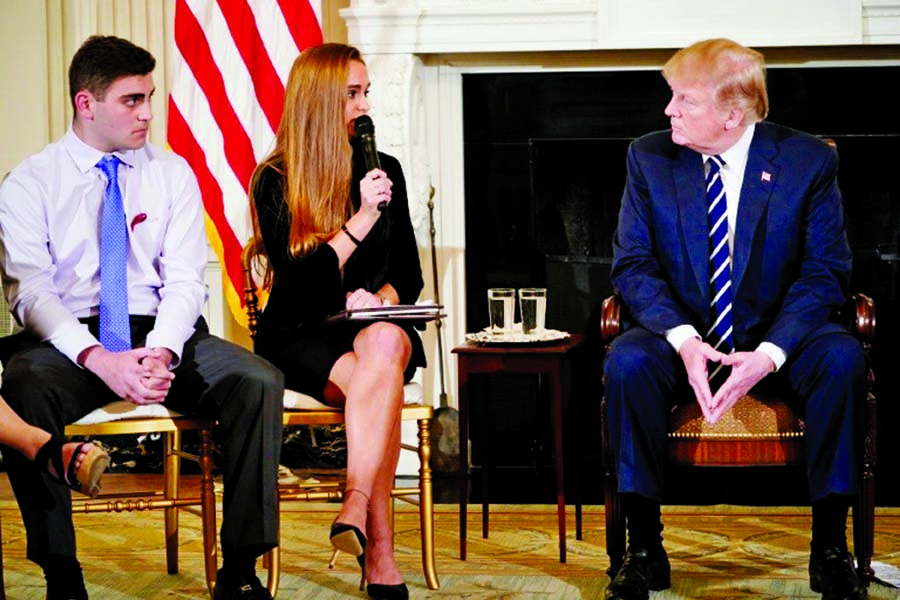
US President Donald Trump has said arming teachers could prevent school shootings like that which left 17 people dead last week in Florida. Teachers carrying a concealed gun could end attacks “very quickly”, he said.
Mr Trump floated the proposal – long-championed by the powerful NRA gun lobby – as emotional survivors of the 14 February massacre urged him to take measures to stop similar attacks. The US leader called for improved background checks on gun buyers. “It’s not going to be talk like it’s been in the past,” he said.
President Trump listened to pleas for gun reform on Wednesday from about 40 students, teachers and families in the executive mansion’s state dining room. Hundreds of teenagers from the Washington DC suburbs rallied outside at the time – some voicing support for arming teachers. Andrew Pollack, whose daughter Meadow died in last week’s attack – the second-deadliest shooting at a US public school – said: “We, as a country, failed our children.” Mark Barden – whose son Daniel was killed in the 2012 shooting at Sandy Hook Elementary School in Connecticut – said more guns was not the answer.
“Schoolteachers have more than enough responsibilities right now, than to have to have the awesome responsibility of lethal force to take a life,” he said. At his White House event, Mr Trump promised to look “very strongly” at calls for educators to be armed with guns – a position long held by the National Rifle Association (NRA). “If you had a teacher who was adept at firearms,” he said, “they could very well end the attack very quickly.” “Where a teacher would have a concealed gun on them,” he said, while acknowledging the plan was controversial, “they would go for special training and they would be there, and you would no longer have a gun-free zone. Throughout his presidential campaign he endorsed the idea of an armed citizenry as a defence against attacks.
But during the 2016 election campaign, he denied that he was in favour of guns in classrooms.
Stoneman Douglas High School had an armed guard on duty during last week’s attack – but he never discharged his gun. The local sheriff told reporters the deputy never encountered the shooter.
But putting an armed teacher in every classroom is a divisive topic – a 2013 poll by the National Education Association found only 22% of teachers said they approved of the idea of arming staff, while 68% of teachers said they were opposed. And 72% of teachers said they would not want to carry a gun even if the law allowed.
In Colorado, free training is provided for teachers who wish to arm themselves – part of which involves imagining one of their own students entering the classroom with a gun. A ban on some types of weapons, advocated for by many students, is unpalatable for supporters of the second amendment – which governs the right to bear arms.
Lawmakers in Florida’s state legislature rejected a proposal on Tuesday to even debate banning such weapons.
They said, however, that will consider raising the minimum age to buy assault rifles – like the one police say was used in the massacre – from 18 to 21.
Mr Trump’s listening session came a day after he directed his administration to take steps to ban gun “bump stocks”. The accessories – which enable a rifle to shoot hundreds of rounds a minute – were used by a gunman who killed 58 concert-goers in Las Vegas last October.
The NRA – which contributed an estimated $30m (£21m) to help elect Mr Trump – opposes a total ban on bump stocks but supports some regulation of the devices and some changes to background check legislation. Is there a mood change? In Florida, survivors of the shooting poured into the state capital to demand lawmakers restrict sales of assault rifles. It was the first organised protest of the youth-led anti-gun movement that has swept the US since the attack in Parkland, Florida. Other students in Chicago, Illinois; Pittsburgh, Pennsylvania; and Phoenix, Arizona walked out of classes in solidarity. The issue formed a main part of a “town hall” debate staged by CNN on Wednesday night, where Florida Senator Marco Rubio felt the articulate anger of a bereaved parent. Mr Rubio was repeatedly booed and later said banning semi-automatic weapons was “a position well outside the mainstream”.

